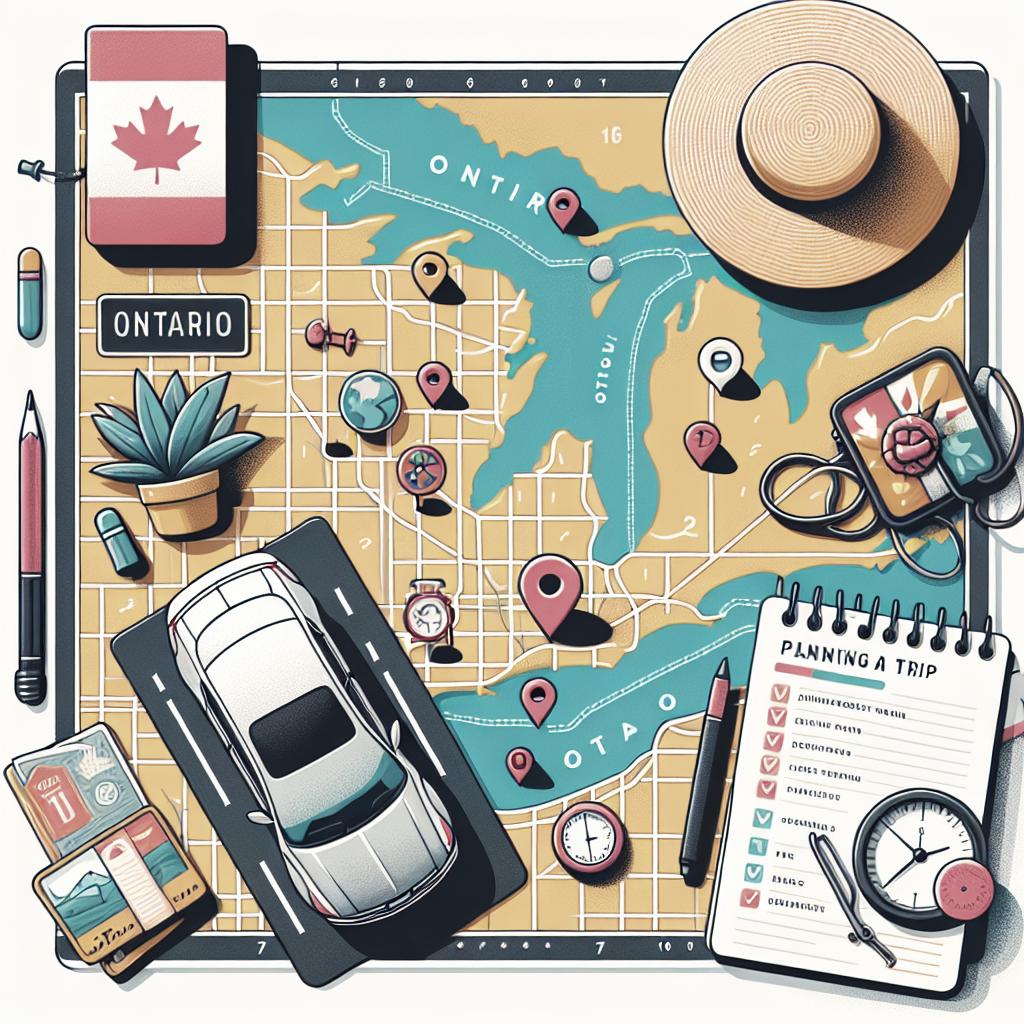“`html
L’Ontario, province canadienne aux multiples facettes, offre un riche patrimoine historique et culturel. Que vous soyez passionné par les merveilles naturelles ou les événements marquants de l’histoire, plusieurs sites en Ontario méritent l’exploration. Dans cet article, nous allons vous présenter certains des lieux historiques les plus emblématiques et incontournables de la région. Préparez-vous à un voyage au cœur de l’histoire et de la beauté naturelle de l’Ontario.
Les chutes Niagara
Les chutes Niagara sont l’une des merveilles naturelles les plus célèbres du monde. Situées à la frontière entre l’Ontario et l’État de New York, ces chutes d’eau majestueuses attirent des millions de visiteurs chaque année. Que ce soit le spectaculaire Rideau derrière les chutes ou une croisière en bateau au pied des cascades, l’expérience est tout simplement inoubliable.
Outre la beauté naturelle des chutes, la région offre également une riche histoire. Depuis les batailles de la guerre de 1812 jusqu’à son rôle dans le développement de l’industrie touristique canadienne, Niagara est une véritable icône culturelle. Visitez les nombreux musées et sites historiques environnants pour une immersion complète dans le passé de la région.
Le parc Algonquin
Le parc Algonquin est le plus ancien parc provincial du Canada, offrant un vaste terrain de jeux pour les amoureux de la nature et de l’histoire. Avec plus de 7 500 kilomètres carrés de forêts, lacs et rivières, ce parc est un sanctuaire de biodiversité et d’histoire naturelle. Vous pouvez explorer ses sentiers de randonnée légendaires et découvrir la faune locale.
Le parc est également célèbre pour sa riche histoire autochtone. Plusieurs sites archéologiques offrent un aperçu des cultures indigènes qui ont habité cette région pendant des millénaires. Des programmes éducatifs et des expositions vous permettent de mieux comprendre l’importance culturelle de ce lieu magnifique.
Le Stratford Festival
Le Stratford Festival, fondé en 1953, est l’un des festivals de théâtre les plus prestigieux du Canada. Situé dans la charmante ville de Stratford, en Ontario, le festival attire des amateurs de théâtre du monde entier pour des productions de haute qualité de pièces classiques et contemporaines.
Le festival est particulièrement reconnu pour ses productions de Shakespeare, mettant en scène des acteurs de renom sur des scènes emblématiques. En dehors des performances théâtrales, le festival propose également des ateliers, des conférences et des événements spéciaux qui enrichissent l’expérience culturelle des visiteurs.
L’Haut-Da Cieux de la Tour CN
La Tour CN est un symbole iconique de Toronto et de l’Ontario. Culminant à plus de 550 mètres de hauteur, cette structure impressionnante est une prouesse d’ingénierie et offre des vues panoramiques exceptionnelles sur la ville et au-delà. L’EdgeWalk, une promenade en plein air autour du sommet, est une expérience palpitante pour les amateurs de sensations fortes.
En plus d’être une attraction touristique majeure, la Tour CN est également étroitement liée à l’histoire moderne de Toronto. Construite en 1976, elle a joué un rôle significatif dans le développement de la ville en tant que centre économique et culturel majeur.
La Colline du Parlement
Située à Ottawa, la Colline du Parlement est le cœur politique du Canada. Ce complexe de bâtiments historiques abrite les bureaux du gouvernement canadien et offre une vue imprenable sur la rivière des Outaouais. Les visiteurs peuvent assister à des réunions parlementaires, des cérémonies officielles et des spectacles de lumière et son en soirée.
La colline est également riche en histoire et en symbolisme. De nombreux monuments et statues honorent des figures importantes de l’histoire canadienne. Une visite guidée permet de découvrir l’architecture impressionnante des bâtiments et l’histoire fascinante du système politique canadien.
Le rafting sur la rivière des Outaouais
La rivière des Outaouais est non seulement une merveille naturelle mais aussi un centre d’activités historiques et récréatives. Le rafting sur cette rivière tumultueuse est une aventure exaltante qui vous plonge au cœur de la nature sauvage canadienne. Les rapides offrent une montée d’adrénaline pour les amateurs de sensations fortes.
En plus de l’aventure, naviguer sur la rivière des Outaouais permet de découvrir son importance historique. Cette voie navigable était cruciale pour le commerce des fourrures et la colonisation européenne. Des guides experts partagent des récits passionnants sur l’histoire et l’écologie de la région tout au long du parcours.
Great Spirit Circle Trail
Le Great Spirit Circle Trail est une expérience culturelle unique offerte par la communauté Anishinaabe de l’île Manitoulin. Cette série de sentiers et de programmes éducatifs permet aux visiteurs de se plonger dans la culture et les traditions autochtones. Les guides locaux partagent leurs connaissances sur l’art, la musique, les légendes et la cuisine indigènes.
Participer à une excursion avec le Great Spirit Circle Trail est non seulement une aventure éducative mais aussi une manière de soutenir les communautés autochtones locales. C’est une occasion d’apprendre et de comprendre les racines profondes et les contributions des Premières Nations à l’histoire canadienne.
Une visite guidée en train du canyon Agawa
La visite guidée en train du canyon Agawa est une destination prisée pour les amoureux de la nature et de l’histoire. Cette excursion ferroviaire vous emmène à travers des paysages magnifiques du nord de l’Ontario, avec des forêts denses, des falaises escarpées et des cours d’eau scintillants.
Le canyon Agawa, marqué par ses peintures rupestres autochtones et ses histoires de pionniers, offre un aperçu fascinant de l’histoire naturelle et culturelle de la région. Le trajet en train est accompagné de commentaires informatifs qui enrichissent l’expérience en reliant les paysages à des récits historiques captivants.
Le parc historique du fort William
Le parc historique du fort William, situé à Thunder Bay, est une reconstitution vivante de l’époque des postes de traite des fourrures au Canada. Ce site impressionnant offre une fenêtre sur la vie au début du 19ème siècle, avec des acteurs en costume d’époque et des démonstrations de métiers traditionnels.
Les visiteurs peuvent explorer les bâtiments authentiques, participer à des activités interactives et assister à des reconstitutions de scènes de la vie quotidienne. Le parc offre une expérience immersive qui illustre l’importance économique et culturelle du commerce des fourrures dans l’histoire canadienne.
Les Mille-Îles
Les Mille-Îles, situées dans le fleuve Saint-Laurent à la frontière entre l’Ontario et l’État de New York, sont un ensemble pittoresque de plus de 1 800 îles. Cette région est célèbre pour ses paysages époustouflants, ses maisons historiques et ses châteaux majestueux comme le Château Boldt.
Une croisière fluviale permet de découvrir la beauté naturelle et les histoires fascinantes des Mille-Îles. Les récits de pirates, de contrebandiers et les légendes locales ajoutent un charme mystérieux à cette région pittoresque. C’est une destination idéale pour une escapade romantique ou une aventure familiale.
Autres articles que vous pourriez apprécier
Huit façons de revigorer le corps et l’esprit au Canada
Dix festivals et événements canadiens qui enflamment l’hiver
Les cultures autochtones au cœur des grandes villes du Canada
Des cerisiers en fleurs, un Canada plein de couleurs
Six routes touristiques à découvrir en Ontario
Les meilleures patinoires extérieures du Canada
Célébrez la culture autochtone en Ontario avec ces fantastiques balades à thème
Les 11 meilleurs points de vue pour contempler les couleurs de l’automne en Ontario
Pourquoi vous devez visiter le parc Algonquin
Réflexions finales
| Lieu | Points clés |
|---|---|
| Les chutes Niagara | Wonder naturelle, riche histoire culturelle et musée régionaux |
| Le parc Algonquin | Vaste biodiversité, histoire autochtone et sentiers légendaires |
| Le Stratford Festival | Productions théâtrales de haute qualité, Shakespeare |
| L’Haut-Da Cieux de la Tour CN | Vues panoramiques, symbolique architecturale de Toronto |
| La Colline du Parlement | Cœur politique, histoire et architecture impressionnante |
| Le rafting sur la rivière des Outaouais | Aventure en eaux vives, importance historique du commerce de fourrures |
| Great Spirit Circle Trail | Immersion dans les cultures autochtones, soutien aux communautés locales |
| Une visite guidée en train du canyon Agawa | Paysages spectaculaires, histoires locales et peintures rupestres |
| Le parc historique du fort William | Reconstitution vivante du passé, commerce des fourrures |
| Les Mille-Îles | Beauté naturelle, récits de pirates et de légendes locales |
“`


